Global reporter round-up: Thatcher reaction
- Published
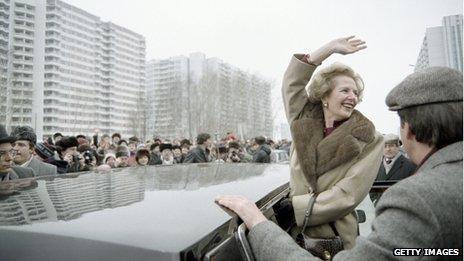
Margaret Thatcher visiting Moscow in 1987
BBC correspondents from around the world report on the international reaction to the death of Baroness Thatcher.
IAN PANNELL, WASHINGTON
Margaret Thatcher remains perhaps the most widely recognised and admired British prime minister in America after Sir Winston Churchill. Her bond with former President Ronald Reagan is often held up as a shining example of the so-called "special relationship" between the two nations.
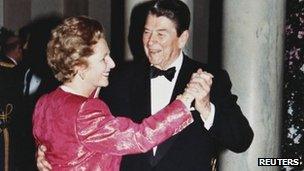
Lady Thatcher cements the "special relationship" with President Reagan in 1988
President Barack Obama called her a champion of "freedom and liberty", saying America had "lost a true friend". Like others, he paid tribute to her achievement in becoming Britain's first female prime minister: "She stands as an example to our daughters that there is no glass ceiling that can't be shattered."
Presidents Carter, Clinton and Bush also offered praise and condolences, with former Secretary of State Colin Powell describing her as a woman of influence and power: "The hairstyle, the dress, her manner, the way in which she carried that handbag. When she walked into a room, you knew that somebody had arrived and you'd better be careful."
American conservatives continue to admire and be influenced by Margaret Thatcher. The Republican Party chairman called her "one of the world's great conservative leaders" who "inspired a generation far beyond the shores of Great Britain".
Perhaps the most moving response came from actor Meryl Streep, who portrayed the British leader on screen. The actor said "she was a figure of awe for her personal strength and grit", singling out her rise to the top against the odds in a system that was "class bound and gender phobic".
STEVE EVANS, BERLIN
Respect rather than affection has been the general German reaction. Chancellor Angela Merkel said that Baroness Thatcher had been no feminist but "by proving herself as a woman in the highest democratic post, she gave an example to many".
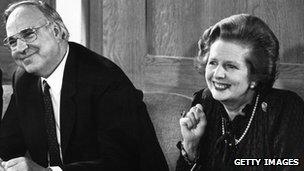
Lady Thatcher strongly opposed German re-unification
Former Chancellor Helmut Kohl said he "greatly valued Margaret Thatcher for her love of freedom, her incomparable openness, honesty and straightforwardness".
As British Prime Minister at the time of the fall of the Berlin Wall, Lady Thatcher had opposed German re-unification. The foreign minister of the time, Hans-Dietrich Genscher, bemoaned that view, blaming it on her background: "Many of her beliefs were influenced by her childhood in the World War II more than by the challenges of the post-war period."
Bild, the country's most popular paper, said she wasn't liked but she was respected. Die Frankfuerter Allgemeine Zeitung called her "an icon of clarity". The Tageszeitung, on the left of German politics, says: "Thatcher gleefully trod on the workers."
DIARMAID FLEMING, DUBLIN
Margaret Thatcher's time in Number 10 saw relations with the Republic of Ireland decline to their worst post-war level - over Northern Ireland and also the 1982 Falklands War which the Irish government under Charles Haughey opposed.
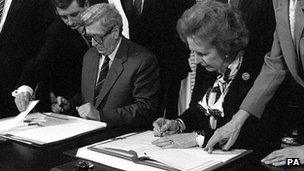
Margaret Thatcher signed the Anglo Irish Agreement in the face of unionist hostility
Reflecting her widespread unpopularity in Ireland while in office, political tributes were measured. President Michael D O'Higgins - a fierce opponent of Thatcherism while a politician - said her place in history was assured but her legacy would be "discussed and debated for many years". He praised her signing the 1985 Anglo-Irish Agreement - giving Dublin a formal role in the affairs of Northern Ireland for the first time - as a "valuable early contribution to the search for peace and political stability".
Despite some praise on phone-in shows for her policies against the IRA, her uncompromising stance during the 1981 H-Blocks hunger strikes in which 10 protesting republican prisoners died has been remembered largely negatively: Fianna Fail and opposition leader Micheal Martin said her "hardline approach" to Northern Ireland may have helped boost IRA recruitment.
The most strident political criticism came from Sinn Fein President Gerry Adams who said that Mrs Thatcher had brought "great hurt to the British and Irish people" and described her policy on Ireland as a "total and absolute failure".
Media analysis has noted that far from being an Iron Lady "not for turning", her public stance could differ from that behind the scenes - such as signing the Anglo-Irish Agreement in the face of furious Ulster unionist opposition, and opening secret negotiation channels with the IRA.
ANDREW HARDING, JOHANNESBURG
Baroness Thatcher was a polarising and influential figure in South Africa - and reactions to her death have been forceful and divided.
Members of the old apartheid government, like the former President FW de Klerk, have praised her support for "constructive engagement" and her opposition to "draconian sanctions and isolation" in the years before democracy.
But to those who fought apartheid, Lady Thatcher was a figure of hate. "I say good riddance," said Pallo Jordan, who was a senior figure in the ANC during those turbulent years.
The current government here has tried to tread a more diplomatic line. Presidential spokesman Mac Maharaj acknowledged her as a "formidable figure". But the governing ANC said it had been "on the receiving end" of her "failure to isolate apartheid".
South Africa's trade union federation, Cosatu, called her a "unique figure" who "personified the brutal attacks on the working class during the 1980s".
DANIEL SANDFORD, MOSCOW
Russians respect strong leaders, and that has been reflected in their reaction to Baroness Thatcher's death.
President Vladimir Putin described her as one of the "most outstanding political figures of the modern world".
The former Soviet General Secretary and President Mikhail Gorbachev, who she famously did business with, said she would go down in history.
"We achieved mutual understanding," he said, "and that made a contribution to the changing atmosphere in the relations between our country and the West, and to the end of the Cold War."
But of course those who remember the Soviet Union fondly were more critical. Ivan Melnikov, the First Deputy Chairman of the Communist Party said she had "politically seduced" Mr Gorbachev, and had played "a major part in the destruction of the USSR". But even he paid tribute to her strength of character.
It was a Russian journalist, Captain Yuri Gavrilov who first coined the phrase "Zheleznaya Dama" - "Iron Lady" - all the way back in 1976.
The coverage of her death has brought more metaphors. The pro-government newspaper Izvestia said her political style was like that of a surgeon's scalpel - "decisive" but "leaving behind terrible scars".
JEREMY BOWEN, MIDDLE EAST EDITOR
Baroness Thatcher famously told the first President George W Bush not to get "wobbly"' after Saddam Hussein sent Iraqi troops into Kuwait in 1990.
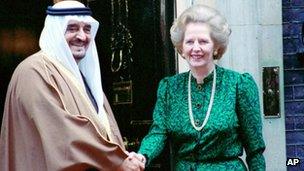
Lady Thatcher was closely involved in the talks that led to the al-Yamamah deal with Saudi Arabia
Her response to what was happening in Kuwait was conditioned by her own experience of the war to recapture the Falklands Islands from Argentina in 1982. And Britain had its own reasons to protect oil supplies from the Gulf, as well as what had become a highly lucrative business relationship with Saudi Arabia.
From early on in her premiership, Lady Thatcher recognised the commercial possibilities in the Gulf. She was closely involved in the negotiations that led to the al-Yamamah arms deal, selling British warplanes worth tens of billions of pounds to Saudi Arabia. The deal has also been surrounded by allegations that bribes were paid to members of the Saudi royal family.
Since her death was announced on Monday, both Israel's president and prime minister have praised her support for their state. During her time in Number 10, though, Britain was one of the first western countries to establish relations with the Palestine Liberation Organisation, pressing it to recognise the existence of Israel.
In 1989 she sent William Waldegrave, then a junior minister in the Foreign Office, to Tunis to meet PLO officials and eventually the Palestinian leader Yasser Arafat. It was one of the steps that led to the Oslo process.
MATTHEW PRICE, BRUSSELS
"The mother of neo-liberalism and the cause of the credit crisis." The Dutch left-leaning daily De Volkskrant offered that as one view of "the woman who changed the world". The paper said others would remember her as a "woman who brought down the Communist world".
Europe's papers concur on one point: Baroness Thatcher changed things.
For Spain's El Pais, she was not just the Iron Lady, she was the Iron Revolutionary. Online, France's Le Monde reproduced Tuesday's front page of the Socialist Worker ("A brutal ruling-class warrior is dead") though it took that down and replaced it with a "Love her or hate her" quote.
In Germany, Frankfurt's Allgemeine Zeitung, broadly sympathetic to the right, called her an "Icon of Clarity", praising her as a politician who spoke her mind and stood by her principles.
"England lost its best man" read the Tageszeitung headline. "Thatcherism", it said, is a synonym for unbridled capitalism and the destruction of the welfare state.
In Belgium's De Standaard you see perhaps the most eye catching photo, external: Margaret Thatcher rather reminiscent of an early Hollywood icon, as she attended the 25th anniversary commemorations of the signing of the Treaty of Rome.
The paper said when it was first printed back in 1982, Thatcher's staff asked for a copy for her grandchildren. She thought it "the most beautiful portrait ever made of her", said the paper.
YOGITA LIMAYE, MUMBAI
In India, Margaret Thatcher was one of the best-known British leaders, and her death has drawn reactions from political and business leaders around the country.
Prime Minister Manmohan Singh expressed sadness at her death and said in a statement: "She was a transformative figure under whom the United Kingdom registered important progress on the national and international arena."
Indian businesswoman Kiran Mazumdar Shaw tweeted: "Margaret Thatcher was a great role model for women all over the world."
Most national newspapers have published obituaries of the late UK prime minister, calling her the woman who changed and divided Britain. The media have also highlighted her relationship with the country's first and only female Prime Minister, Indira Gandhi.
Mrs Gandhi was already head of state when Margaret Thatcher met her during a visit to India in 1976. Comparisons have often been drawn between the two leaders as strong-willed women politicians who took bold yet controversial decisions.
MARTIN PATIENCE, BEIJING
Baroness Thatcher may have been known as the "Iron Lady" but in China she is best remembered for the negotiations that led to the return of Hong Kong.
It was during her time in the office that she signed the agreement that led to the handover of the British colony in 1997.
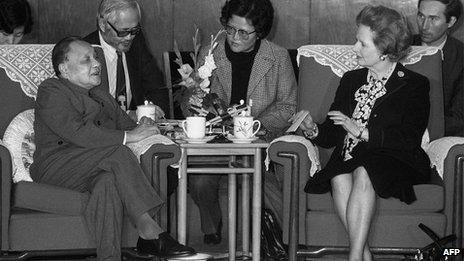
In China Lady Thatcher is hailed for the handover of Hong Kong
For China's leaders the return of Hong Kong to Chinese sovereignty was a hugely symbolic moment and cause of much rejoicing across the country.
News of her death featured on the front-pages of most of the Chinese newspapers. She was praised by state media as an "outstanding" leader for what it described as her compromise over Hong Kong.
One analyst quoted in the China Daily - an English-language newspaper - said she sought dialogue over confrontation.
An editorial in the People's Daily newspaper - the mouthpiece of the Communist Party - said it was hard to deny her "remarkable achievements". But it also noted a softer side in her character and said that as a woman she had some leadership qualities that men could never match.
VLADIMIR HERNANDEZ, BUENOS AIRES
Margaret Thatcher was never the most popular world leader in Argentina.
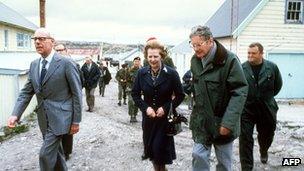
For Argentines Lady Thatcher is inevitably linked to the Falklands War
The conservative newspaper La Nacion had Baroness Thatcher on its front page under the headline: "She marked an era, but left a wound."
The left-leaning daily Pagina 12, which is closer to the government, chose a much more direct headline: "Galtieri waits for her in hell," referring to Argentina's last military ruler whom Lady Thatcher is credited with helping to bring down.
Many here associate her with the defeat of Argentina in the Falklands War in 1982, and in particular with the sinking of the warship General Belgrano by a British submarine, when more than 300 hundred Argentine sailors died.
It was one of the bloodiest chapters of the war and it remains an open wound for some in Argentina. But there are also those who hold no grudges.
"It was a war. What can you expect her to do?" says Jose Luis Ferreira, a veteran of the conflict and a survivor of the General Belgrano incident.
As a 17-year-old sailor he spent 24 hours adrift under freezing temperatures when his ship was sunk - a harrowing experience that marked him forever, he told the BBC.
"She was defending her country. It was not a rivalry between people but between nations," Mr Ferreira added.
"I think she deserves our condolences. May God forgive her."
-
 Thatcher: 'A woman who shaped events'
02.10
Thatcher: 'A woman who shaped events'
02.10
-
 Cameron: Thatcher 'saved our country'
00.35
Cameron: Thatcher 'saved our country'
00.35
-
 Thatcher: In her own words
05.14
Thatcher: In her own words
05.14
-
 Clarke on working with Thatcher
03.47
Clarke on working with Thatcher
03.47
-
 Obituary: Baroness Thatcher
05.01
Obituary: Baroness Thatcher
05.01
-
 'UK's greatest prime minister'
02.01
'UK's greatest prime minister'
02.01
-
 How Thatcher was perceived abroad
04.41
How Thatcher was perceived abroad
04.41
-
 Finchley remembers Margaret Thatcher
03.56
Finchley remembers Margaret Thatcher
03.56
- Published8 April 2013
- Published8 April 2013
- Published8 April 2013
- Published8 April 2013
- Published9 April 2013
- Published9 April 2013
- Published8 April 2013